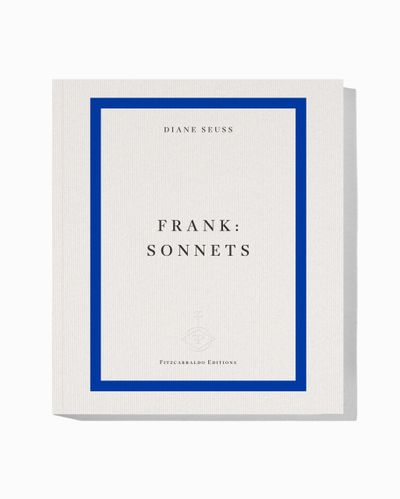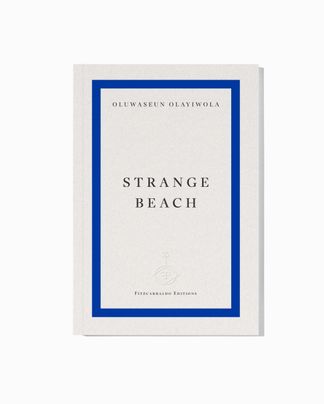‘The sonnet, like poverty, teaches you what you can do / without,’ Diane Seuss writes in this brilliant, candid work, her most personal collection to date. These poems tell the story of a life at risk of spilling over the edge of the page, from Seuss’s working-class childhood in rural Michigan to the dangerous allures of New York City and back again. With sheer virtuosity, Seuss moves nimbly across thought and time, poetry and punk, AIDS and addiction, Christ and motherhood, showing us what we can do, what we can do without, and what we offer to one another when we have nothing left to spare. Like a series of cels on a filmstrip, frank: sonnets captures the magnitude of a life lived honestly, a restless search for some kind of ‘beauty or relief.’ Seuss is at the height of her powers, devastatingly astute, austere, and – in a word – frank.

frank: sonnets
Winner of the 2022 Pulitzer Prize for Poetry
French paperback with flaps, 96 pages | Published 13 February 2025
frank: sonnets
0
I drove all the way to Cape Disappointment but didn’t
have the energy to get out of the car. Rental. Blue Ford
Focus. I had to stop in a semi-public place to pee
on the ground. Just squatted there on the roadside.
I don’t know what’s up with my bladder. I pee and then
I have to pee and pee again. Instead of sightseeing
I climbed into the back seat of the car and took a nap.
I’m a little like Frank O’Hara without the handsome
nose and penis and the New York School and Larry
Rivers. Paid for a day pass at Cape Disappointment
The problem with sweetness is death. The problem
with everything is death. There really is no other problem
if you factor everything down, which I was no good at
when studying fractions. They were always using pie
as their example. Rather than thinking about factoring
things down, I wondered what kind of pie. And here
I am, broke, barely able to count to fourteen. When
people talk about math, they say you’ll need it to balance
your checkbook. What is a checkbook and what,
indeed, is balance? Speaking of sweetness, for a time
I worked in a fudge shop on an island. After a week
the smell of sweetness made me heave, not to mention
the smell of horses; it was an island without cars,
shit everywhere. When I quit, the owner slapped me.
Intimacy unhinged, unpaddocked me. I didn’t want it.
Believe me, I didn’t want it anymore. Who in their
right mind? And then it came like an ice cream truck
with its weird tinkling music, its sweet frost. I fled
to the shore and saw how death-strewn, all the body
parts washed up and sucked clean like that floor mosaic
by Sosus of Pergamon, Unswept House. Seabirds
flocked and dematerialized like they do. Bees raged
at their own dethroning. Love came close anyway,
found me out, its warped music all the rage. It had
a way, just by being in proximity, of opening
the shells of the bivalves. Disclosing their secret
meat. One doesn’t really suck on frozen sugar water.
One allows it to melt in the oven of the mouth.
I met a man a dying man and I said me too.
Met a dead man and I said me too. Must be
dead cuz the living can’t meet the dead and he
said me too. Did you know the dead can fall
in love he said. Fact. Did you know the dead
fall in love better than the living cuz nothing
left to lose. The root of all blues. Skeptical still
I strode onward in my seven-league boots as in
the fairy tale “Hop-o’-My-Thumb” from a book
of German fairy tales given to me when I had
chicken pox. Scratching myself bloody, the ogre
gored to death by wild beasts. Seven leagues per
stride toward a dead banjo player in a bad
mood. Enchanteur. Or zauberhaft in German.
(…)
‘The lightning intelligence of Diane Seuss’s poems strikes equally the lavish external world and the harrowed interior. A brilliant and devastating account of the making and survival of a poet, frank: sonnets has a relentless, lambent urgency; by its final pages I had to remind myself to breathe.’
— Garth Greenwell, author of Small Rain
‘Every poem in frank: sonnets is an example of the incomparable Seussian Sonnet…. Acute, resolute, buoyant, and unflinching, frank rings loudest as a synonym for candor, so much do these poems feel tethered to a real life, a real world, simultaneously grounded and spiritual, verbal and existential, with resonances of the blues.’
— Terrance Hayes, author of American Sonnets
‘Seuss transforms “tragic spectacle” into something beautiful, visionary, “revolting and grand”.’
— The Nation
‘This book is a response to death, a way of living in knowledge of death’s privations…. What Seuss is hoping for is an extended enough death to allow for a witty recognition of the shape it is imposing on the life it ends. Beyond that, though, what she wants is enough life to make her death into a kind of “last rhyme”, a sound that radiates both into the past and into the future, where it might make contact with your body, or mine.’
— Kamran Javadizadeh, London Review of Books
‘Alongside Terrance Hayes, Diane Seuss has a strong case to be considered as the most influential American poet of the last 10 years. A former social worker, over six collections she has become renowned for her fearless excavation of her life in her work…. With her formidable voice, Seuss is one of the most important poets writing now.’
— Rishi Dastidar, Telegraph
‘One of the US’s most radical and important poets has finally found a home in the UK…. Seuss’s writing bristles with irreverent humour and wily energy.’
— Rebecca Tamás, Guardian
‘These poems are taut and careful glimpses into a life lived on the fringes but threaded with wildness; there is a constant sense that everything they contain might erupt at any moment…. If autobiographical writing is an attempt to fix a life inside language, frank: sonnets and Modern Poetry are both convincing arguments for the absolute impossibility of ever really succeeding in doing so. Instead, they offer an alternative: debris, glimpses, constellations, ghosts. Suffering and all its attendant bewilderment is given the space it deserves, and pleasure, transcendence, and love are all given due space alongside it.’
— Maija Makela, Stinging Fly
‘Seuss layers the work with a litany of cultural and literary references…. It is at that bright, fascinating collision between tradition and innovation that these poems reside.’
— Soft Punk Magazine
‘The whole book is … barbed and artful, dramatizing both Seuss’s writing life and her life-life, staking out a territory for the reader to look at and admire but never to control or own.’
— Poetry Foundation
‘frank: sonnets feels very close to writing; it is a heady, intoxicating experience. Seuss understands the labour of a sonnet’s particular space – the intensity and the balance, the anaphora and the rhyme that can gallop wild inside the sonnet’s field.’
— The Rumpus
‘This is a writer whose pleasure in building language knocks you over and makes you feel some responsive pleasure.’
— Women’s Review of Books
‘Seuss is at her most moving and morally attuned.’
— Harvard Review
‘In frank: sonnets Diane Seuss has written an ambitious, searing, and capacious life story…. Another collection that staggers, one that makes mastery seem effortless, one that’s honest, true, gorgeously frank.’
— Traci Brimhall, author of Love Prodigal
‘Good lord. I’ve rarely read a book that feels so intimate, so spoken. I’ve rarely read a book that makes me feel so spoken to. So with. These are poems born of a kind of wrought faith that, despite all the breaking, language still might bring us closer to each other, and closer to ourselves. Diane Seuss’s frank: sonnets shares that faith with us. And goddamn, I am so grateful for that.’
— Ross Gay, author of Inciting Joy
Diane Seuss is the author of six books of poetry, including Modern Poetry; frank: sonnets, winner of the Pulitzer Prize, the National Book Critics Circle Award, the Los Angeles Times Book Prize, and the PEN/Voelcker Prize; Still Life With Two Dead Peacocks and a Girl, a finalist for the National Book Critics Circle Award and the Los Angeles Times Book Prize; and Four-Legged Girl, a finalist for the Pulitzer Prize. She was a 2020 Guggenheim Fellow, and in 2021 she received the John Updike Award from the American Academy of Arts and Letters. She lives in Michigan.


